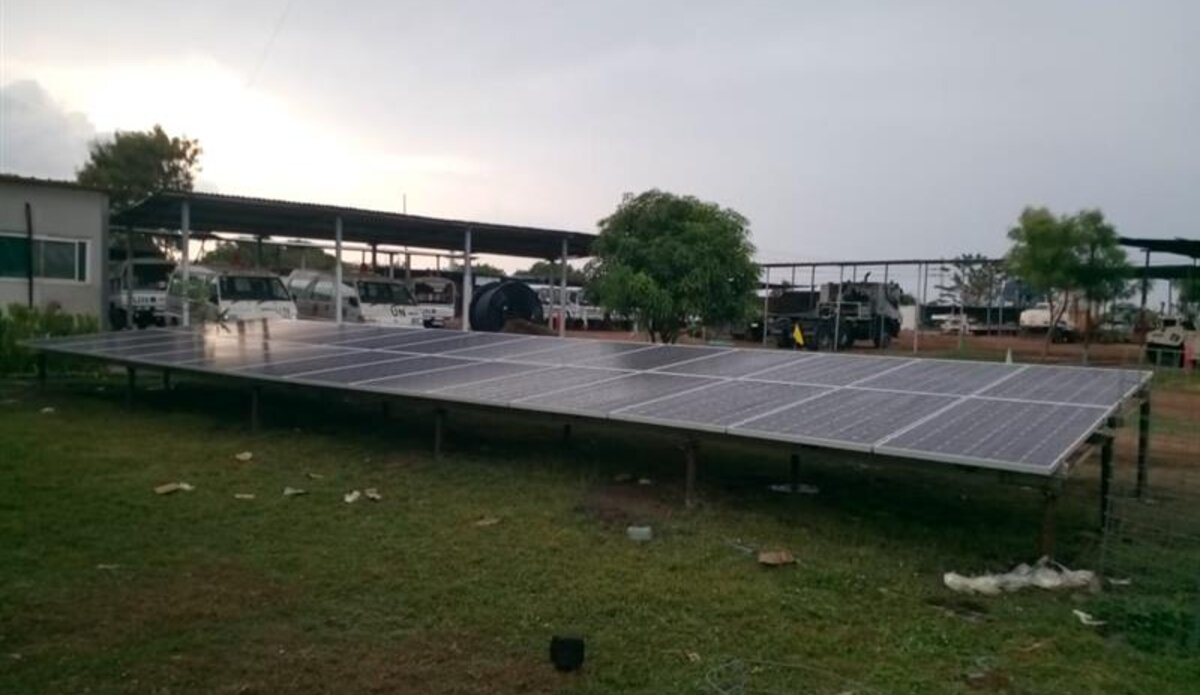As the world’s newest nation begins to emerge from conflict and build a durable peace, engineers from Bangladesh serving with the United Nations Mission in South Sudan (UNMISS) are going beyond their mandate on an issue that’s lies at the heart of all UN peace operations: protecting the environment.
“As engineers, much of our work revolves around repair and rehabilitation of major infrastructure to enable access for local communities to essential services they need,” said Lieutenant Colonel Tanvir Ahmed, contingent commander of the Bangladeshi engineering troops. “However, we wanted to do our bit to ensure that we are conscious of the environment we work in and do our best to reduce our own footprint.”
These efforts resulted in the installation of a 10-kilowatt photovoltaic system at the engineering company’s headquarters within the UNMISS base in Juba, with funding from Bangladesh. The initiative is a commitment the country has made ahead of the 2021 Seoul UN Peacekeeping Ministerial, taking place virtually on 7-8 December.
“As our missions operate in some of the most fragile environmental and operational contexts, it is imperative that we work to reduce missions’ environmental footprint and increase their operational resilience by deploying renewable energy systems,” said Atul Khare, the Under-Secretary-General for Operational Support.
“This pilot project is a great step forward in demonstrating to other troop and police contributing countries the feasibility of solar photovoltaic solutions in military settings and I hope that it will help other Member States explore similar solutions and consider partnerships that could help deploy such equipment in more military and police camps,” he added.
Major Zaman Iftakher Shovan, the Bangladeshi engineer who led the project, explained that the system operates on solar energy and is “grid independent” – meaning it can retain or generate its own power within the main electricity system – which is more reliable and cost-effective.
“The sun is an incredible source of energy,” said the Major. “Simply put, a photovoltaic system converts renewable energy gained from the sun to power a green, clean and sustainable source of electricity on earth. This photovoltaic system that we are installing has 26 panels which have the capacity to generate 25 kilowatts of power. This is huge and what’s more, we are leaving provisions for future contingents to be able to increase the project as they see fit.”
This project demonstrates that solar systems can be utilised and maintained across many contributing country sites and has the potential to substantially reduce fuel usage once implemented on a larger scale.
Nicholas Haysom, the Secretary-General’s Special Representative for South Sudan and Head of UNMISS, underscored that the environment is “germane to peace efforts” in South Sudan.
“The concept of environmental peace building is close to my heart and a priority area for UN peacekeeping missions going forward,” he stressed, noting that environmental challenges are a non-political, cross-cutting topic that knows no borders, concerning everyone equally.
For his part, Lieutenant-Colonel Ahmed urged everyone to consider making small changes in their everyday lives to reduce air pollution. “Such initiatives provide an opportunity for us to roll up our sleeves and do our share in promoting a healthier way of life – something that both we and our planet will benefit from.”

